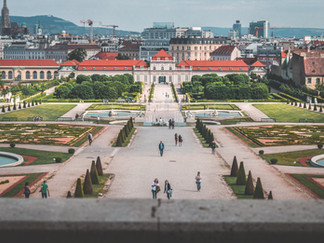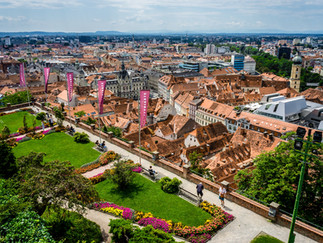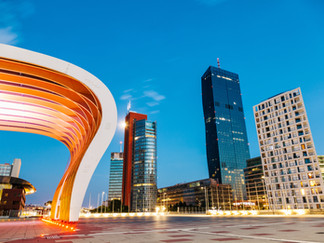TOP OF PAGE
Quick Facts
Best Time To Go
Cost & Spending
Travel Tips
Regions & Highlights
Travel Map
What To See & Do
Itineraries
What To Eat
Hidden Gems
Where To Stay
Trip Planning
ABOUT US

Welcome traveler!
We're Andre & Lisa, adventurers and experienced budget travelers.
We have over two decades of travel experience and since 2018 have led a full-time nomadic lifestyle.
Thank you for visiting and we hope you find value in our destination pages! We thoroughly research and curate all content ourselves and everything you find on this site is put together by only the two of us.

AUSTRIA TRAVEL GUIDE
With glorious Alpine scenery, monumental Habsburg architecture, some of Europe’s most varied museums, and contemporary architecture, Austria has it all. It was once part of the influential Austro-Hungarian Empire and has a rich musical heritage, being the birthplace of many famous composers like Mozart and Strauss. Vienna, the capital, has been a significant cultural and intellectual hub throughout history, drawing creatives and intellectuals from across Europe.
Although Austria is known as the winter sports capital of Europe, it is just as popular for summer tourists who visit its historic cities and villages and hike in the magnificent scenery of the Alps. Austria is perfect to visit any time of year and any outdoor lover's dream.
DO YOU NEED A VISA FOR AUSTRIA?
<<VISA RESULT>>
<< Visa Details >>
For the latest requirements or for application click
Let iVisa take the pain out of travel planning and assist you with Electronic visas, Travel Authorizations, Visas on Arrival, and even Paper Visas. They can also help with Health Declarations and Embassy Registrations. If you're from the US, they provide a One-Stop Shop to renew your Passport securely and error-free.
⬇️ REGIONAL GUIDES ⬇️
TRAVEL GUIDE
TRAVEL GUIDE
TRAVEL GUIDE
TRAVEL GUIDE
TRAVEL GUIDE
TRAVEL GUIDE



⬇️ COUNTRY GUIDE ⬇️

Austria is officially known as the Republic of Austria and is landlocked and bordered by eight countries, including Germany, Italy, and Switzerland.
The country's landscape is predominantly mountainous, with the majestic Alps covering a large area, and it boasts the Grossglockner as its highest peak at 3,798 meters.
The official language is German, and the currency is the Euro (€). English is widely spoken, and the only area most tourists have linguistic problems with is in translating menus. In rural places, however, older people often don't speak any English and it will help to learn a few basic German phrases if travelling to such places.
Electricity is 230V and power outlets are round two-prong sockets (type F which also accepts type C and type E).
Austria is one of the safest countries in the world with violent crime a rarity. Small towns and even uninhabited areas such as forests are incredibly safe at any time of the day. However, beware of pickpockets in crowded places. Bicycle theft can be a problem in bigger cities but is virtually absent in smaller towns. Whatever you do, don’t travel without travel insurance! We would suggest checking out World Nomads, for travel insurance as they have the best coverage for active travellers.
Fun Facts:
Austria introduced the world to the first postcards and has the oldest national flag design in the world, dating back to the 12th century.
Austria boasts the world's oldest zoo, the Tiergarten Schönbrunn founded in 1752, and the Austrian National Library, which is one of the major libraries globally.
QUICK BOOKING RESOURCES

SEASONS AT A GLANCE
Most destinations have different times of the year when they’re more or less popular with tourists.
Peak Season
Shoulder Season
Off Peak Season
JANUARY
HOT
COLD
MODERATE
DRY
WET
FEBRUARY
HOT
COLD
MODERATE
DRY
WET
MARCH
HOT
COLD
MODERATE
DRY
WET
APRIL
HOT
COLD
MODERATE
DRY
WET
MAY
HOT
COLD
MODERATE
DRY
WET
JUNE
HOT
COLD
MODERATE
DRY
WET
JULY
HOT
COLD
MODERATE
DRY
WET
AUGUST
HOT
COLD
MODERATE
DRY
WET
SEPTEMBER
HOT
COLD
MODERATE
DRY
WET
OCTOBER
HOT
COLD
MODERATE
DRY
WET
NOVEMBER
HOT
COLD
MODERATE
DRY
WET
DECEMBER
HOT
COLD
MODERATE
DRY
WET

BEST TIME TO VISIT AUSTRIA
Peak tourist season in Austria is actually split between summer and winter and choosing the best time to visit Austria might entirely depend on your reasons for visiting and what you plan on doing during your stay.
July & August - Alpine hiking in Tyrol, lake swimming in Salzkammergut, and lots of summer festivals.
September & October - New wine in vineyards near Vienna, golden forest strolls, and fewer crowds.
December & January - Christmas markets, skiing in the Alps and Vienna, waltzing into the New Year.

Generally, winter is busier than summer when hordes of skiers and snowboarders seek out the powdery slopes over the Christmas and New Year periods.
The best time to visit Vienna and Salzberg is during spring and autumn as the weather is pleasant and you might avoid the peak tourist months of August and September when these popular cities burst at their seams. During this time most of the major music and art festivals take place and you will find limited options for accommodation and very full restaurants.
During summer months the mountain regions are very pleasant in between the odd summer shower and especially in the Alpine region, evenings can be cool.
BEST TIME FOR:
Austria, known for its picturesque landscapes, also offers a variety of beautiful beaches. Noteworthy spots include the Badestrand Hallstatt, which provides stunning views and clear waters, and the Strandbad Velden, popular for its clean facilities and family-friendly atmosphere.
The best time to visit these beaches is during the summer months, from June to August, when the weather is warm and conducive for outdoor activities. During this period, you can enjoy the vibrant atmosphere and the natural beauty of Austria's lakeside beaches.

FIND ALTERNATIVES TO AUSTRIA?
FIND YOUR
PERFECT
DESTINATION
Advanced, real-time destination filter by visa required, region, health risk, travel budget, country value, tourist seasons, best weather and activity or sport.

MORE POSTS ON AUSTRIA

WEWILLNOMAD

WEWILLNOMAD

WEWILLNOMAD
Consider visiting Austria during the shoulder season as prices are generally higher during the winter months when people head to the Alps for skiing. They're also higher during the mid-summer months when many families travel here on vacation. You're likely to find the best deals during the spring or fall months when tourist crowds are at a minimum and demand is at its lowest. Do not forget to consider the entry fees for museums and historical buildings in your budget as these can prove to be fairly expensive!
You should plan to spend around $120 per day on your vacation in Austria. On average, expect to spend $30 on meals for one day and $20 on local transportation. Hotels are plentiful throughout the country. Expect to pay about $50 - $60 for a simple double room outside of the touristy areas, and up to $70-$130 in the busier towns.
GETTING AROUND AUSTRIA
Rural or sparsely populated regions in Austria are easier to explore by car as bus services can be infrequent. Many popular activity spots in the mountains are really accessible only by car or on foot.
Rent a car if you plan to explore rural or mountainous areas not well-served by public transport. Book in advance to get the best rates. Opt for smaller cars to save on rental and fuel costs. If you will be driving on Austrian motorways you will be liable to pay toll fees - which are done in the form of a Vignette toll pass, which should be purchased in advance at any petrol station at the border, or online.
Intercity trains are punctual and with a comprehensive network, it covers most of Austria. Unless you are doing a lot of intercity travelling in 3 days, individual tickets are actually cheaper than the one-country pass. Comfortable and moderately priced, these trains connect major cities and many towns. Use the ÖBB for intercity travel. Book tickets online in advance for discounts.
Buses serve less significant towns and lakes, and these two forms of transport are integrated and designed to complement each other - intercity coaches exist but don't provide anywhere near the level of intercity rail service.
FIND DISCOUNT FLIGHTS TO AUSTRIA
TRAVEL TIPS FOR AUSTRIA
Visiting Austria for the first time can be a wonderful experience, full of beautiful landscapes, rich history, and vibrant culture. Here are some tips to help you make the most of your trip, including how to save money and navigate the country efficiently:
Saving Money in Austria
Accommodation:
Book in Advance: Secure your lodging early to get the best deals, especially during peak seasons.
Stay in Hostels or Budget Hotels: Look for hostels, guesthouses, or budget hotels. Consider using Airbnb for affordable and unique accommodations.
Stay Outside City Centers: Accommodation outside the main tourist areas is often cheaper and still well-connected by public transport.
Meals:
Eat Like a Local: Visit neighbourhood markets and grocery stores. Supermarkets like Spar, Billa, and Hofer (Aldi) offer good value.
Lunch Specials: Opt for lunches rather than dinners. Many restaurants offer cheaper lunch menus (Mittagsmenü).
Street Food and Bakeries: Have a bite at street vendors and bakeries (Bäckerei) for affordable and tasty meals.
Sightseeing:
City Cards: Many cities, like Vienna and Salzburg, offer city cards (e.g., Vienna Pass, Salzburg Card, Innsbruck City Pass) that include free or discounted entry to attractions and public transport.
Free Attractions: Explore free attractions such as parks, historical sites, and some museums. Cities like Vienna have numerous free activities.
Walking Tours: Join free walking tours (tip-based) to learn about the city’s history and culture from knowledgeable guides.

General Tips fo visiting Austria
Learn Basic German Phrases: While many Austrians speak English, knowing some basic German phrases can enhance your experience and help in rural areas.
Carry Some Cash: Smaller businesses and restaurants may prefer cash. ATMs are widely available.
Politeness and Punctuality: Austrians value politeness and punctuality. Always greet with a friendly “Grüß Gott” or “Guten Tag” and be on time for appointments and tours.
REGIONS & HIGHLIGHTS OF AUSTRIA
Austria is probably as famous as a tourist destination for the beautiful Alps as it is for its history of music and opera. Mountains cover three-quarters of the country, with the remaining one quarter filled with vineyards, rolling hills, and river gorges. Most visitors come to see the mountains, and they will not be disappointed.
Here are some of the main regions in Austria along with some highlights for each:
VIENNA (WIEN)
As the capital of Austria, Vienna offers a unique blend of historical grandeur and contemporary culture. From the majestic Hofburg Palace to the vibrant coffee house culture, there's an abundance of sights to explore. Enjoy the city's world-renowned music scene, including classical concerts that echo its rich musical heritage. With its elegant architecture, lush parks, and a high quality of life, Vienna is not just a visual feast but also a testament to its storied past and dynamic present.
Schönbrunn Palace: A UNESCO World Heritage site, this Baroque palace was the summer residence of the Habsburg monarchs.
Hofburg Palace: The former imperial winter residence, now home to several museums and the Austrian president's office.
St. Stephen's Cathedral: A Gothic masterpiece located in the heart of the city.
Vienna State Opera: One of the leading opera houses in the world.
Museums Quartier: A cultural complex with numerous museums, including the Leopold Museum and the Museum of Modern Art.
SALZBURG
Salzburg, a city where history and culture dance through the streets and the music of Mozart fills the air. Nestled among the Eastern Alps, Salzburg is a symphony of baroque architecture, scenic landscapes, and rich musical heritage. As the birthplace of Mozart, it's a paradise for classical music lovers, with the Salzburg Festival celebrating this legacy every summer. Don't miss the historic Salzburg Fortress, which offers panoramic views of the city, or the charming Mirabell Palace and Gardens. For a truly immersive experience, visit the tourist information offices at Mozartplatz Square or the main station for personalized recommendations.
Hohensalzburg Fortress: One of the largest medieval castles in Europe, offering panoramic views of the city.
Mirabell Palace and Gardens: Famous for its beautifully landscaped gardens.
Mozart's Birthplace: A museum dedicated to the life and works of Wolfgang Amadeus Mozart.
Salzburg Cathedral: A stunning example of Baroque architecture.
Getreidegasse: A charming shopping street in the old town with historic buildings and unique boutiques.
TYROL (TIROL)
Tyrol, the heart of the Austrian Alps, where majestic mountains and enchanting landscapes await to touch your soul. Here, you can immerse yourself in a world of outdoor adventure, from skiing on pristine slopes in the winter to hiking through lush trails in the summer. Experience the warmth of Tyrolean hospitality, indulge in the rich cultural history, and savor the local cuisine. Tyrol is not just a destination; it's a backdrop for unforgettable memories and a place where nature's beauty is in harmony with a vibrant cultural life.
Innsbruck: The capital of Tyrol, known for its Golden Roof, the Imperial Palace, and the Bergisel Ski Jump.
Kitzbühel: A famous ski resort town with picturesque streets and world-class skiing.
Stubai Valley: Offers great hiking and skiing opportunities, including the Stubai Glacier.
Zillertal Alps: Ideal for outdoor activities like hiking, skiing, and mountain climbing.
UPPER AUSTRIA (Oberösterreich)
A region where history and modernity blend seamlessly against a backdrop of stunning natural landscapes. From the technological innovations of Linz to the timeless beauty of Hallstatt, Upper Austria offers a diverse array of attractions. Explore the rolling hills, take in the cultural heritage, and enjoy the gastronomic delights. Whether you're seeking outdoor adventures or a peaceful retreat, Upper Austria promises an unforgettable experience.
Linz: Known for its vibrant arts scene, including the Ars Electronica Center and the Lentos Art Museum.
Hallstatt: A UNESCO World Heritage site, this picturesque village on the shores of Lake Hallstatt is known for its salt mines and stunning views.
Mauthausen: The site of the Mauthausen Concentration Camp Memorial.
Traunsee Lake: Surrounded by mountains, it's perfect for water sports and scenic boat trips.
STYRIA (STEIERMARK)
Styria is the green heart of Austria, with a harmonious blend of natural wonders and architectural marvels. From the rolling hills and lush vineyards to the historic charm of its capital, Graz, Styria offers a diverse palette for all travellers. Explore the imposing Riegersburg Castle, perched atop a volcanic rock, or unwind amidst the modern art at Kunsthaus Graz. Whether you're seeking adventure in the Dachstein mountains or tranquility in the world's largest monastic library at Admont Abbey, Styria promises an unforgettable journey.
Graz: Austria's second-largest city, with a well-preserved old town, the Schlossberg, and the futuristic Kunsthaus Graz.
Riegersburg Castle: A historic fortress with stunning views and interesting exhibitions.
Styrian Wine Country: Known for its rolling vineyards and excellent wine tasting tours.
Therme Loipersdorf: One of the largest thermal spas in Europe.
CARINTHIA (Kärnten)
The sunny jewel of Austria's south, where nature's generosity is on full display. Here, you can dive into the crystal-clear waters of over 200 warm bathing lakes or ascend the majestic peaks that offer breathtaking views. Embrace the cultural diversity of the Alpe-Adria region, bask in the mild climate, and experience the warm hospitality of the locals. Whether you're seeking adventure or tranquillity, Carinthia is a destination that promises unforgettable memories.
Wörthersee: A popular summer destination with crystal-clear waters and numerous activities.
Klagenfurt: The capital of Carinthia, with its beautiful old town and the Lindwurm fountain.
Nockberge National Park: Offers great hiking trails and breathtaking landscapes.
Minimundus: A miniature park featuring models of famous buildings from around the world.
LOWER AUSTRIA (Niederösterreich)
Niederösterreich is a region where history and culture intertwine amidst a picturesque landscape. Here, you can explore the serene Danube Valley, dotted with vineyards and medieval villages like the charming Drosendorf. Discover the architectural marvel of Melk Abbey or delve into the ancient Roman city of Carnuntum. With its less mountainous terrain, Lower Austria offers a unique blend of tranquil countryside and rich historical sites, making it an enchanting destination for any traveller.
Wachau Valley: A UNESCO World Heritage site known for its wine, charming villages, and the Melk Abbey.
Vienna Woods (Wienerwald): Ideal for hiking and exploring historic sites like Mayerling and Heiligenkreuz Abbey.
Kreuzenstein Castle: A medieval castle with fascinating collections of weapons and medieval artifacts.
VORARLBERG
Vorarlberg is Austria's westernmost gem, where the charm of the Alps meets modern culture. Nestled between Lake Constance and the high peaks, Vorarlberg is a tapestry of stunning landscapes, innovative architecture, and vibrant traditions. Explore the picturesque villages, indulge in the local culinary delights, and immerse yourself in the region's rich cultural offerings, from the Bregenz Festival to the Schubertiade. With its accessible public transport and a plethora of activities, Vorarlberg promises an unforgettable experience for every traveller.
Bregenz: Known for the Bregenz Festival with its famous floating stage on Lake Constance.
Lech: A picturesque village and a popular ski resort.
Montafon: A valley with excellent hiking and skiing opportunities.
Bregenzerwald: Known for its unique wooden architecture and scenic beauty.
WHAT TO SEE AND DO IN AUSTRIA
WHAT TO SEE AND DO IN AUSTRIA
VIENNA
The capital, Vienna, possessing a unique and distinct identity, is characterised by its rich architecture and famous river, the Danube. Along with its charming old town centre, Saint Etienne Cathedral, Donaupark, the pedestrian road of Kärtner Strasse, the Imperial Palace, and the Opera House to name just a few there is no shortage of interesting sights. Slowing down to sample the famous Viennese café culture will be a highlight of your visit.
Watch the magnificent Lipizzan horses perform at the Spanish Riding School. With a history of over 440 years, the school is the best place in the country to witness riders in their impeccable outfits, personifying the height of classical riding and horsemanship. Watching the daily morning exercise is a beautiful and peaceful experience, and one of the most authentic attractions in Austria.
The incredible Schönbrunn Palace, located in Vienna, Austria, was the main summer residence of the Habsburg rulers. This Baroque palace is not only a significant architectural sight but also a cultural and historical monument that reflects over 300 years of history. The palace's name, meaning "beautiful spring," originates from an artesian well on the grounds. Visitors can explore the 1,441-room palace, its vast gardens, and even a zoo, making it a major tourist attraction and a testament to the legacy of the Habsburg dynasty.
SALZBURG
Salzburg, a city with a rich history and cultural heritage, is renowned for its well-preserved baroque architecture and its status as a UNESCO World Heritage Site.
Nestled near the Austrian-German border, Salzburg's name, which translates to "salt city," hints at its historical salt mining industry. The city is also celebrated as the birthplace of the legendary composer Wolfgang Amadeus Mozart, and it hosts one of Austria's largest music festivals, underscoring its reputation as the nation's musical capital. Interestingly, every third resident in Salzburg is employed in the tourism sector, reflecting the city's allure to visitors worldwide. Moreover, Salzburg boasts the oldest nunnery in the German-speaking world, adding to its array of historical landmarks, which includes the formidable Hohensalzburg Fortress, accessible by a specially built cable car from the old town.
EISRIESENWELT ICE CAVES
The Eisriesenwelt Ice Caves, located in Werfen, Austria, are a natural marvel and the largest ice cave system in the world. Stretching over 42 kilometers, only the first kilometer is open to tourists, showcasing breathtaking ice formations created by thawing snow that refreezes inside the cave. Discovered in 1879, these caves are a testament to nature's artistry, with the icy interior illuminated by torchlight, creating an otherworldly experience for visitors.
SALZMELTEN
Salzmelten in Austria refers to the fascinating world of salt mines, which are a significant part of the country's cultural heritage. The Salzwelten salt mines, such as those in Hallstatt, Hallein, and Altaussee, offer visitors a glimpse into the ancient practice of salt mining. Hallstatt is renowned for having the world's oldest salt mine, where you can explore deep underground tunnels and learn about the history of salt mining that dates back 7,000 years. Altaussee, on the other hand, is known for being the largest active salt mine in Austria and has a storied past involving art looted by the Nazis during World War II. These mines collectively showcase the importance of salt in Austria's past and present.
DANUBE RIVER
Cycling along the Danube in Austria offers an enchanting experience, with the Danube Cycle Path being a classic route that attracts thousands of cyclists annually.
The journey from Passau to Vienna is particularly famous, allowing riders to immerse themselves in Austria's stunning landscapes, Baroque cities, and cultural hotspots like Linz. The Wachau region, known for its apricot dumplings and wines, is a highlight, offering delicious treats in its many taverns and inns. Ending in Vienna, cyclists can explore the city's rich history, including Schönbrunn Palace and the Danube Island.
TRAVEL ITINERARIES FOR AUSTRIA
For first-time visitors to Austria, it's best to explore a mix of its vibrant cities, historic sites, and stunning natural landscapes. Here are our suggested itineraries for one week and two weeks in Austria:
ONE WEEK
Day 1 - Vienna:
Morning: Explore Schönbrunn Palace and its gardens.
Afternoon: Visit the Hofburg Palace and the Imperial Apartments.
Evening: Enjoy a performance at the Vienna State Opera or a classical concert.
Day 2 - Vienna:
Morning: Discover St. Stephen’s Cathedral and climb the tower for city views.
Afternoon: Stroll through the MuseumsQuartier, visiting the Leopold Museum.
Evening: Wander around the historic center and have dinner at a traditional Viennese restaurant.
Day 3 - Salzburg:
Morning: Take a train to Salzburg (about 2.5 hours).
Afternoon: Visit Hohensalzburg Fortress and enjoy the views.
Evening: Walk through the old town and dine along the Getreidegasse.
Day 4 - Salzburg:
Morning: Explore Mozart’s Birthplace and the Salzburg Cathedral.
Afternoon: Relax in Mirabell Gardens and visit the Hellbrunn Palace.
Evening: Attend a Mozart dinner concert for an immersive experience.
Day 5 - Innsbruck:
Morning: Travel to Innsbruck by train (about 2 hours).
Afternoon: Visit the Golden Roof and the Imperial Palace.
Evening: Explore the old town and try local Tyrolean cuisine.
Day 6 - Innsbruck:
Morning: Ride the Nordkette Cable Car for breathtaking alpine views.
Afternoon: Visit the Bergisel Ski Jump and the Tyrolean Folk Art Museum.
Evening: Enjoy a leisurely walk along the Inn River.
Day 7 - Hallstatt:
Morning: Travel to Hallstatt by train and ferry (about 3 hours).
Afternoon: Explore the picturesque village and visit the salt mines.
Evening: Stroll around Lake Hallstatt and take in the serene views.
TWO WEEKS
Day 1-3 - Vienna:
Follow the same itinerary as in the one-week plan.
Extra Day 3: Visit the Belvedere Palace and its art collections. Spend the evening at Prater amusement park.
Day 4-6 - Salzburg:
Follow the same itinerary as in the one-week plan.
Extra Day 6: Take a day trip to the Salzkammergut region, including lakes such as Wolfgangsee and the village of St. Gilgen.
Day 7-8 - Innsbruck:
Follow the same itinerary as in the one-week plan.
Extra Day 8: Take a day trip to the Swarovski Crystal Worlds in Wattens or hike in the nearby Stubai Valley.
Day 9-10 - Hallstatt and Upper Austria:
Day 9: Follow the same itinerary as in the one-week plan for Hallstatt.
Day 10: Morning: Take a boat trip on Lake Hallstatt. Afternoon: Visit the Dachstein Ice Cave and the Five Fingers viewing platform. Evening: Return to Hallstatt for dinner.
Day 11-12 - Graz:
Day 11: Morning: Travel to Graz by train (about 3.5 hours). Afternoon: Explore the historic old town and the Hauptplatz. Evening: Dine at a local restaurant and enjoy the nightlife.
Day 12: Morning: Visit the Schlossberg and the Uhrturm. Afternoon: Discover the Kunsthaus Graz and the Murinsel. Evening: Stroll along the Mur River and relax in a café.
Day 13-14 - Zell am See and Kaprun:
Day 13: Morning: Travel to Zell am See by train (about 3 hours). Afternoon: Explore the town and walk along Lake Zell. Evening: Enjoy dinner with a view of the lake.
Day 14: Morning: Visit the Kitzsteinhorn Glacier in Kaprun. Afternoon: Relax at the Tauern Spa or take a boat trip on the lake. Evening: Return to Vienna or Salzburg for your departure.
This itinerary covers a wide range of attractions in Austria, from historical sites to natural beauty.

WHAT TO EAT IN AUSTRIA
Austrian food may not be internationally renowned, but it is hearty and tasty, and you will find plenty of regional delicacies to try. Typical local favourites include schnitzel (breaded and shallow-fried pork) and kaiserschmarn (a lightly caramelized pancake). Prices tend to be reasonable throughout, and even small restaurants serve decent meals. In the major cities, there is no lack of cuisine choices, from ethnic to international.
Great eats can also easily be had from street vendors, as well as from simple sausage shops, many of which have small windows where freshly grilled sausages and brötchen (crusty bread rolls) are served. A beer or a glass of wine goes perfectly with almost every Austrian meal.
One of Austria's national dishes, Wiener Schnitzel is certainly its most successful export. Traditionally pounded very thin, breaded, crisply pan-fried, and typically garnished with lemon and fresh parsley, it's often served with a simple salad with vinaigrette, Austrian potato salad, steamed potatoes, or French fries.
Wiener Wurstel (Viennese Sausages) are made from both beef and pork, encased in sheeps' intestine these well-known sausages are usually served with sharp mustard and is perfectly accompanied with Austrian potato salad, radishes, and spring asparagus. Many people will enjoy the simplicity and value of procuring a Wiener Wurstel from a street vendor, slathering it with mustard and gobbling it down right there on the spot.
The Sachertorte is a proud symbol of the Austrian capital. It's a dense, chocolate sponge cake made with thin layers of apricot jam that's topped with a semi-firm chocolate icing. Although some say the Café Sacher in Vienna is over-rated, sampling a slice of the famous and scrumptious cake along with a cup of Viennese coffee is an absolute must. The recipe is a closely held secret, and this is the only place where you supposedly can eat the 'original' Sachertorte.
Apfelstrudel (Apple Strudel) is an Austrian delicacy loved all around the world, you will find it sold in bakeries, cafes, and restaurants around Vienna. Apfelstrudel gained in popularity around Eastern Europe under the influence of the Habsburg empire and is a delicate counterpoint to the slightly heavier (and generally sweeter) American apple pie.
The famed Viennese Melange, similar to a cappuccino but usually without cocoa powder, is topped with half hot milk and half foamed milk. Cappuccinos in Austria are generally topped with whipped cream, rather than milk. If you're looking for an Americano, ask for a Verlängerter (literally, "longer"); plain coffee with cream is a Brauner, and espresso or double espresso is referred to as a Schwartzer.
LGBTQ IN AUSTRIA
I'm a paragraph. I'm connected to your collection through a dataset.

WHERE TO STAY IN AUSTRIA
For first-time visitors to Austria, choosing the right area or region to stay in can greatly enhance your experience of this beautiful country. Here are some recommendations along with accommodation suggestions for each category: budget, mid-range, and luxury.
Where to Stay in Vienna:
Vienna, the capital city of Austria, is renowned for its rich history, stunning architecture, world-class museums, and vibrant cultural scene, offering visitors a perfect introduction to Austrian culture and heritage.
Budget: Austria Trend Hotel Ananas Wien: This hotel offers budget-friendly accommodations near the famous Naschmarkt. Guests appreciate its clean rooms, friendly staff, and convenient location close to public transportation.
Mid-range: Hotel Sans Souci Wien: Located in the historic city center, Hotel Sans Souci Wien offers mid-range accommodations in a luxurious setting. Guests can enjoy elegant rooms and suites, a wellness area with a spa and fitness center, and fine dining at the hotel's restaurant.
Luxury: Hotel Sacher Wien offers opulent accommodations and impeccable service. Guests can indulge in luxurious rooms and suites, gourmet dining at the hotel's renowned restaurants, and the famous Sacher Torte at the café.
Hotel Sacher Wien
Where to Stay in Salzburg:
Salzburg is famed as the birthplace of Mozart and the setting for "The Sound of Music," with its well-preserved old town, picturesque surroundings, and cultural heritage, making it a charming destination for history and music enthusiasts alike.
Budget: Hotel Turnerwirt: Situated just outside the city center, Hotel Turnerwirt provides budget-friendly accommodations with simple rooms and basic amenities. Guests enjoy its convenient location and easy access to public transportation.
Mid-range: Hotel & Villa Auersperg - Hotel & Villa Auersperg offers mid-range accommodations in a historic building near the Mirabell Palace. Guests can stay in stylish rooms and suites, enjoy access to a garden and wellness area, and indulge in organic breakfast options.
Luxury: Schloss Mönchstein Hotel: This luxury hotel is located on a hill overlooking the city of Salzburg. Guests can stay in luxurious rooms and suites, enjoy access to a spa, outdoor pool, and gourmet restaurant, and experience unparalleled views of the city and surrounding mountains..
Schloss Mönchstein Hotel
Where to Stay in Innsbruck:
Innsbruck, the capital of the Tyrol region, is renowned for its stunning alpine scenery, imperial architecture, and outdoor recreational opportunities, offering a perfect blend of culture and adventure.
Budget: Hotel Zach: Hotel Zach offers budget-friendly accommodations in a central location near the Old Town of Innsbruck. Guests appreciate its clean rooms, friendly staff, and complimentary breakfast.
Mid-range: Hotel Innsbruck - Hotel Innsbruck offers mid-range accommodations in a prime location near the Golden Roof and the Old Town. Guests can stay in stylish rooms and suites, enjoy access to a spa area with saunas and a rooftop pool, and dine at the hotel's restaurant serving Austrian and international cuisine.
Luxury: The Penz Hotel - Situated in the heart of Innsbruck, The Penz Hotel offers luxurious accommodations with stunning views of the Tyrolean Alps. Guests can stay in stylish rooms and suites, enjoy access to a rooftop terrace with panoramic views, and indulge in gourmet dining at the hotel's restaurant.
Regardless of where you choose to stay, Austria offers a diverse range of accommodation options to suit every budget and preference. It's a good idea to book your accommodation in advance, especially during the peak tourist season (from June to August), to ensure availability and secure the best rates.
CHOOSE ANOTHER DESTINATION
PLAN YOUR TRIP
VISA SERVICES
Let iVisa take the pain out of travel planning and assist you with electronic visas, Travel Authorizations, Visas on Arrival, and even Paper Visas. They can also help with Health Declarations and Embassy Registrations. If you're from the US, they also provide a One-Stop Shop to renew your Passport securely and error-free.
FLIGHTS
Find a cheap flight by using Skyscanner or Momondo. These are our favourite flight search engines. They index other travel websites and airlines across the globe to easily find you the best deal.
ACCOMMODATION
Booking.com is our number one resource for researching and booking accommodation. In addition to Booking.com, we have found Agoda.com to consistently returns the cheapest rates in Southeast Asia.
TRANSPORT
DiscoverCars.com is a leader in online car rental bookings; we compare car rental deals from many companies so that you can choose which is best for your trip. 12Go connects the world door-to-door, from transfers to flights, under the same user-friendly ticket.
INSURANCE
Travel insurance can protect you against unexpected illness, injury, theft, and cancellations.
-
Heymondo (International Travel Insurance)
-
World Nomads (Travel / medical insurance for long-term travellers and nomads)
-
SafetyWing Nomad Insurance (Travel / medical insurance for long-term travellers and nomads)
Need more help to book your trip?
Check our complete resource page for all the best companies to use when you travel. You will only find the companies we use ourselves.
Please note that some of the links above may be affiliate links, and at no additional cost to you,
we may earn a commission if you end up making a purchase.

















































































































